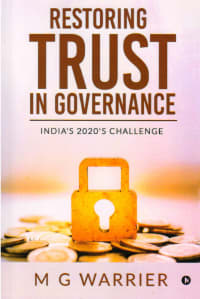The book will be very useful to the bankers, economists and students pursuing studies on Indian banking and other financial sectors.
“Restoring TRUST in Governance: India’s 2020’s challenge” is M G Warrier’s third book with focus on banking and finance. As economic reforms and structural changes in the Institutional System serving the financial sector in India are gaining momentum, this book and Warrier’s 2018 book “India’s Decade of Reforms” have some policy relevance.
The impact of the recent developments on Indian Economy has been covered at the appropriate places in some chapters in this book. In the preface the author mentions that “as of now, it is the fire-fighting stage and it will take longer to quantify losses and put in place what one may call a comprehensive “Post-Pandemic Rehabilitation Plan.” Present debates are all speculative in nature.”
Restoring TRUST in Governance discusses recent GOI and RBI initiatives to take forward Financial Sector and Economic Reforms and suggests possible policy refinements to infuse professionalism in governance and resources management.
The book is organized in three sections. Section I on Development Issues cover agenda for Modi 2.0 (2019-24), some aspects of universal basic minimum income and the relevance of NYAY, pros and cons of privatizing public sector and India’s approach towards gold management.
Section II on ‘Banking for Growth’ covers RBI’s role in confidence boosting, monetary policy since the setting up of Monetary Policy Committee (MPC), some aspects of policy challenges before the Reserve Bank of India, need for a strong central bank, relationship issues between RBI and GOI in the context of formulation and implementation of monetary and fiscal policies and general perceptions about the impact of changes in RBI’s policy rates on financial market.
In Section III ‘Professionalizing Financial System’ the book covers measures being taken to professionalize and strengthen the Financial Sector with focus on regulation and supervision of the banking system.
Clearly, the author has a quarrel with the glaring trust deficit in governance and the Institutional System. But the book has, perhaps consciously, avoided dwelling on the possible contribution of political leadership and the silent majority which remains passive spectators, for the present state of affairs. Professionals, even post-retirement, prefer to keep “social distance” from controversies.
The book will be very useful to the bankers, economists and students pursuing studies on Indian banking and other financial sectors.





























